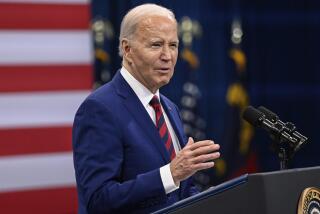Campaigns turn attention to New Hampshire
Triumphant or chastened, candidates for president swept across New Hampshire on Friday in a fusillade of campaigning, opening a four-day battle before voters cast ballots in the first primary of the 2008 presidential contest.
Democrat Barack Obama and Republican Mike Huckabee, as euphoric as they were exhausted, sought to turn their Thursday night victories in the Iowa caucuses into momentum for Tuesday’s vote.
“Last night the American people began down the road to change,” the Illinois senator said in an airport hangar here. “And four days from now, New Hampshire, you have the chance to change America.”
So dominant was Obama’s Iowa trouncing of John Edwards and Hillary Rodham Clinton that even Republican winner Huckabee reached for his coattails.
“I think if you look at both the Democrat and Republican side, Obama and me, we both represent, frankly, a generational change, but change nonetheless,” the former Arkansas governor told NBC’s “Today Show,” in one of a round-robin series of interviews by the candidates that delineated the thrust of the onrushing campaign.
The winners had no time to relish victory. Both Clinton, Obama’s chief Democratic rival in New Hampshire, and Republican Mitt Romney, who placed second to Huckabee in Iowa, spent Friday sharpening criticism of their rivals.
Clinton told reporters in Manchester that Obama’s record needed scrutiny, and her campaign aides hinted that negative ads were in the works. And the New York senator brushed aside her third-place showing in Iowa, a state she had courted for more than a year. According to a Nielsen Monitor-Plus survey, she aired 10,488 radio and television ads between early December and Jan. 1.
“Iowa does not have the best track record in determining who the party nominates,” Clinton told reporters in Manchester. “Everybody knows that.”
She said the caucuses, a complicated venue at best, had “disenfranchised” many voters, including those who work at night and could not attend.
A new target
Romney, for his part, turned from aiming at Huckabee to Sen. John McCain of Arizona, his main challenger in New Hampshire. He was critical of McCain’s more moderate positions on illegal immigrants and his past criticism of Bush administration tax cuts.
“There’s no way that Sen. McCain is going to be able to come to New Hampshire and say he’s the candidate who represents change, that he’ll change Washington,” Romney told reporters at a hotel news conference in Portsmouth. “He is Washington.”
McCain, like Romney, embraced the notion that voters in both parties Thursday had sent an emphatic rebuke of politics as usual.
“I was the agent of change,” McCain said, ticking off his insistence on revising the Bush administration’s Iraq strategy, his shepherding of campaign finance reform and his opposition to extravagant federal projects. He also offered a pointed criticism of Romney, who ran for statewide office as a GOP moderate but has clothed himself in conservative garb in the presidential race.
“My record is [as] a conservative Republican and it hasn’t changed. It doesn’t change every two years depending on what office I’m running for,” McCain said.
The candidates awoke Friday to a campaign landscape dramatically altered by the events of the previous night.
Obama’s 37.6% showing discarded any claims of invincibility by Clinton, on whom he had been steadily gaining for weeks. And her finish behind former Sen. John Edwards of North Carolina -- 29.7% to 29.5% -- was of only marginal help to Edwards, who had campaigned in Iowa almost nonstop since his second-place finish there in 2004.
The results propelled the Democratic contest into a state that has salved a Clinton’s wounds before -- easing the controversy over draft-dodging and womanizing on the part of her husband, Bill, with a strong second-place for him in 1992. But here, too, Obama has been gaining in the polls, and Edwards, although a distant third, has been trying to set up a campaign operation.
On the Republican side, the Iowa returns fractured former Massachusetts Gov. Romney’s hopes that he could ride his prodigious fundraising and personal fortune to success in the first two contests and onward to the nomination. Huckabee blistered Romney, 34.4% to 25.2%, although the Arkansan was vastly outspent. According to Nielsen Monitor-Plus, Romney aired 9,841 Iowa ads in the weeks leading up to Jan. 1, compared with 998 for Huckabee.
Because of the results, the GOP contest splayed out in different directions.
Romney and McCain are atop the heap in New Hampshire, which is next door to Romney’s home state and in 2000 gave McCain’s free-wheeling presidential bid its biggest boost with his trouncing of George W. Bush.
Though he is trying to ride his Iowa momentum in New Hampshire, Huckabee has no real organization in the state that, unlike Iowa, does not have a large component of his biggest supporters, evangelical Christians. He is looking ahead to South Carolina and its Jan. 19 Republican primary.
McCain and Romney are also both aiming at Michigan on Jan. 15, and former New York Mayor Rudolph W. Giuliani is heavily leveraging his campaign on the Jan. 29 Florida primary, hoping that will propel him into a good showing in the Feb. 5 Super Tuesday contests.
On that day, two dozen contests will be held, including Democratic and Republican primaries in California.
But on Friday, it was all New Hampshire.
Obama flew into the state just before dawn and within hours was rallying voters in the airport hangar. At an overflow event later in Concord, he lauded the young voters who swelled turnout in the Iowa Democratic caucuses to record levels.
“I believed in the young people of America even when everybody said that they would not participate,” Obama said. “We talked to them about the things they care about.”
He had little time to savor the Iowa victory but nonetheless used it to zing Clinton, whose campaign had weeks ago tried to taint Obama as overly ambitious by suggesting that he had been strategizing for the White House since kindergarten.
“This feels good,” he said. “That’s just like I imagined it when I was talking to my kindergarten teacher.”
Acknowledges failings
If Obama was generally adopting the posture of above-it-all front-runner, Clinton was assertively heading into the fray. She said much about Obama’s record was unknown to voters.
“On a lot of these issues, it’s hard to know exactly where he stands. And people need to ask that,” she told reporters in Manchester. “I’m more than happy to take my record and my qualifications, which you all have been extensively going after for many years now, to the voters of New Hampshire. That’s what an election is supposed to be about.”
Clinton acknowledged her strategic failings -- a fundraising e-mail to supporters Friday opened, “We’ve got more work to do” -- and said she needed to boost her support among younger voters and, strikingly, women, who sided marginally with Obama in Iowa.
Edwards’ campaign in New Hampshire was reminiscent of Iowa, where he struggled in the shadow of two celebrity candidates. Although Obama appeared to have cornered the Democratic market in voters seeking “change,” Edwards argued that his brand of fighter was best.
“Listen, I’m the underdog. There’s no question about that,” he said after a speech in Nashua. “I’m going to be here. I’m going to be working, I’m going to be fighting, and I think the people of New Hampshire are looking for someone like that.”
For Huckabee, Friday meant a shift from the overtly religious appeals of Iowa to the emphasis on taxes that has been a defining issue in the first-in-the-nation primary. He used complaints about the Internal Revenue Service to hawk his plan to replace income and corporate taxes with a national sales tax.
“When the IRS comes after you, they want to take every last dime you have, and they’ll spend years getting there, if that’s what it takes,” he said. “I’ve got a better suggestion: Scrap the taxes. Get rid of the IRS. End all taxes on our income.”
Romney vs. McCain
Despite Huckabee’s genial combativeness, the real contest among New Hampshire Republicans was between Romney and McCain, each desperately needing to win here.
Romney wasted no time veering from Huckabee, whom he blistered in Iowa, to McCain, whom he cited in New Hampshire as the personification of dysfunctional Washington.
“I think there is a strong movement in this country to reject Washington and to look for change,” he said in Portsmouth. “And I think I represent change better than other people in this contest.”
As did Huckabee, Romney cited illegal immigration as an issue mishandled by Washington’s politicians. His aides said that McCain’s support for a comprehensive solution to illegal immigration -- once complimented by Romney and now derided by him as amnesty --would be a major target in New Hampshire.
McCain, however, focused sharply on the reformer approach that marked his 2000 run.
“People that live and work inside the Beltway and make lots of money, in certain ways, they don’t like the reformer,” he said. “I understand that.”
Overshadowed in the tumult was Giuliani, the national front-runner until Huckabee’s recent run up the polls. In a chilly hall in Salem, he vowed to lower taxes if elected president.
“Somebody has got to go to Washington that gets control of Washington,” he said. “I got control of New York.”
His first questioner brought him back to the reality.
“Congratulations on New York,” he told Giuliani. “But you’re in New Hampshire now.”
cathleen.decker@latimes.
Times staff writers Michael Finnegan, Dan Morain, Peter Nicholas and Maeve Reston contributed to this report.
More to Read
Start your day right
Sign up for Essential California for news, features and recommendations from the L.A. Times and beyond in your inbox six days a week.
You may occasionally receive promotional content from the Los Angeles Times.









